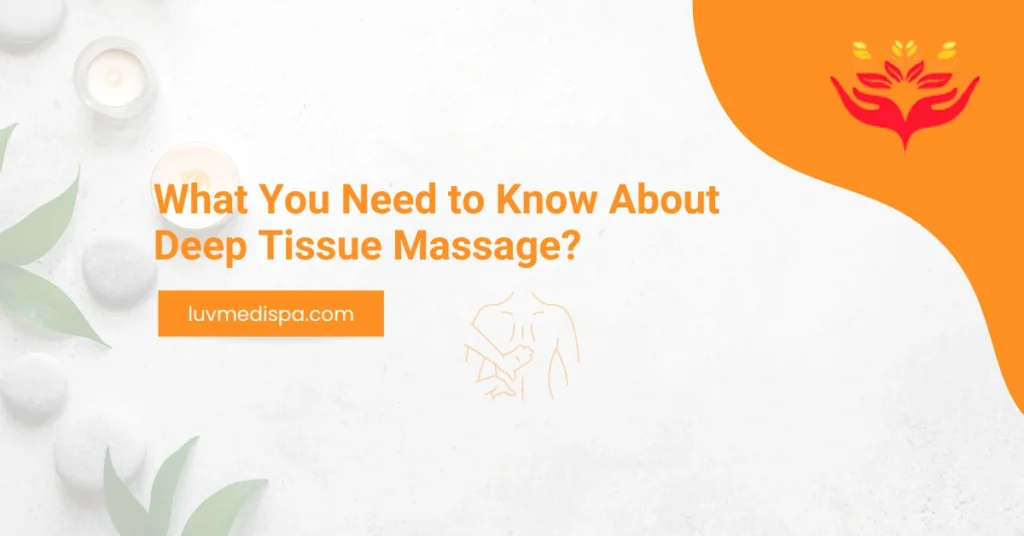If you’re dealing with chronic pain, muscle tension, or sports injuries, you’ve probably heard about deep tissue massage. This therapeutic technique goes beyond simple relaxation to target the deeper layers of muscle and connective tissue.
Understanding what you need to know about deep tissue massage can help you decide if this treatment is right for your specific needs and health goals.
What is Deep Tissue Massage

Deep tissue massage is a specialized massage technique that focuses on reaching the deeper layers of muscles and fascia (the connective tissue surrounding muscles). Unlike relaxation massage, this therapeutic approach uses slower strokes and more direct pressure to target specific problem areas.
The technique involves applying firm pressure and slow strokes to reach deeper layers of muscle and fascia. Licensed massage therapists use their fingers, knuckles, hands, elbows, and forearms to break up scar tissue and physically break down muscle knots or adhesions that can disrupt circulation and cause pain.
Key Characteristics of Deep Tissue Massage
- Targeted pressure: Focuses on specific areas of tension rather than the entire body
- Slow movements: Uses deliberate, slow strokes to penetrate deeper muscle layers
- Firm pressure: Applies more pressure than Swedish massage techniques
- Therapeutic purpose: Designed to address specific medical conditions or injuries
How Deep Tissue Massage Works
Deep tissue massage works by physically breaking down adhesions in muscles, tendons, and ligaments. These adhesions can block circulation and cause pain, limited range of motion, and inflammation. The massage therapist uses various techniques to restore normal movement and reduce pain.
The Science Behind the Technique
When you receive a deep tissue massage, several physiological processes occur:
Increased blood flow: The pressure and manipulation help increase circulation to the treated areas, bringing fresh oxygen and nutrients to the muscles while removing metabolic waste products.
Muscle tension release: The sustained pressure helps relax tight muscle fibers and release chronic patterns of tension that may have developed over time.
Pain reduction: The massage can help reduce pain by blocking pain signals to the brain and releasing endorphins, your body’s natural painkillers.
Improved flexibility: By breaking down scar tissue and adhesions, deep tissue massage can help restore normal range of motion to affected joints and muscles.
Benefits of Deep Tissue Massage
Understanding the benefits of deep tissue massage can help you determine if this treatment approach aligns with your health and wellness goals. Research has shown that deep tissue massage can provide numerous therapeutic benefits.
Physical Benefits
Chronic pain relief: Many people find significant relief from chronic pain conditions such as lower back pain, neck pain, and shoulder tension. Studies have shown that deep tissue massage can be as effective as some medications for certain types of chronic pain.
Improved posture: By releasing tension in muscles that pull the body out of alignment, deep tissue massage can help improve posture and reduce the strain on your musculoskeletal system.
Enhanced athletic performance: Athletes often use deep tissue massage to help prevent injuries, improve performance, and speed recovery from intense training sessions.
Reduced inflammation: The increased circulation and lymphatic drainage can help reduce inflammation in muscles and joints, leading to decreased swelling and improved healing.
Mental and Emotional Benefits
Stress reduction: While deep tissue massage is primarily therapeutic, it can also help reduce stress hormones like cortisol and promote relaxation.
Better sleep quality: Many people report improved sleep after deep tissue massage sessions, likely due to reduced pain and muscle tension.
Improved mood: The release of endorphins during massage can help improve mood and reduce symptoms of anxiety and depression.
Who Should Consider Deep Tissue Massage
Deep tissue massage isn’t suitable for everyone, but it can be particularly beneficial for certain individuals and conditions. Understanding who makes a good candidate for this treatment can help you make an informed decision.
Ideal Candidates
People with chronic pain: Those suffering from conditions like fibromyalgia, arthritis, or chronic back pain may find significant relief through regular deep tissue massage sessions.
Athletes and active individuals: People who engage in regular physical activity, whether recreational or professional, can benefit from deep tissue massage to prevent injuries and improve recovery.
Office workers: Individuals who spend long hours at a desk often develop tension in their neck, shoulders, and back, which can be effectively addressed with deep tissue massage.
People recovering from injuries: Those recovering from sports injuries, car accidents, or other trauma may find that deep tissue massage helps speed the healing process and restore normal function.
Conditions That May Benefit
- Lower back pain
- Neck and shoulder tension
- Plantar fasciitis
- Tennis elbow
- Sciatica
- Muscle strains
- Postural problems
- Tension headaches
What to Expect During Your Session
Knowing what to expect during your deep tissue massage session can help you feel more comfortable and prepared. The experience is typically different from a relaxation massage, and understanding the process can help you get the most benefit from your treatment.
Initial Consultation
Your massage therapist will typically begin with a brief consultation to understand your specific concerns, medical history, and goals for the session. This is an important time to communicate any areas of particular tension or pain, as well as any medical conditions or medications that might affect your treatment.
The Massage Process
Preparation: You’ll be asked to undress to your comfort level and lie on a massage table. Your therapist will use draping techniques to ensure your privacy and comfort throughout the session.
Warm-up: Most therapists begin with lighter pressure to warm up the muscles before moving to deeper work. This helps prepare your body for the more intense pressure to come.
Deep pressure application: The therapist will gradually increase pressure, using various techniques to work on deeper muscle layers. You may feel some discomfort, but it should not be unbearable.
Communication: Your therapist should regularly check in with you about pressure levels and comfort. Don’t hesitate to speak up if the pressure is too intense or if you need adjustments.
Duration and Frequency
Deep tissue massage sessions typically last 60 to 90 minutes, allowing sufficient time to work on problem areas thoroughly. The frequency of sessions depends on your specific needs and goals:
- Acute issues: May require weekly sessions initially
- Chronic conditions: Often benefit from bi-weekly or monthly maintenance sessions
- Athletic performance: May incorporate sessions into regular training schedules
Is Deep Tissue Massage Painful?
This is a common concern. While deep tissue massage involves more intensity than traditional relaxation massage, pain should never be unbearable. At Luv Medispa, we adjust pressure based on real-time feedback to ensure your experience is both therapeutic and comfortable.
If you’re new to deep tissue work, we start with moderate pressure and increase gradually over follow-up sessions.
Book Your Appointment Today
We offer a tranquil, client-focused environment where you can escape daily stress and invest in your well-being. All our therapists are certified, insured, and extensively trained in both Western and Eastern massage techniques. What sets us apart is not just our knowledge—but the care and customization we bring to every treatment.
Ready to experience the restorative benefits of deep tissue massage? Schedule your session at Luv Medispa in Edmonton today. For more information feel free to reach us at info@luvmedispa.com or (780) 250-7500, and let us create a personalized experience just for you.


